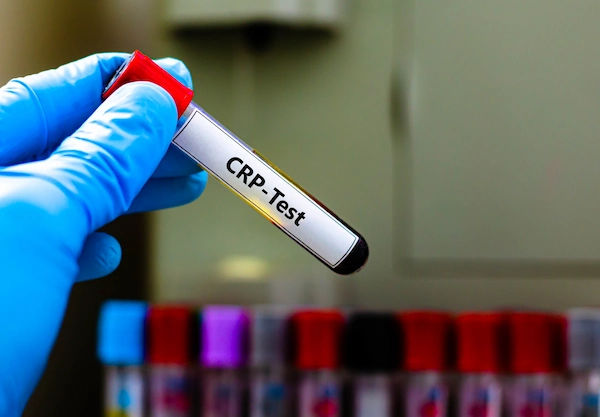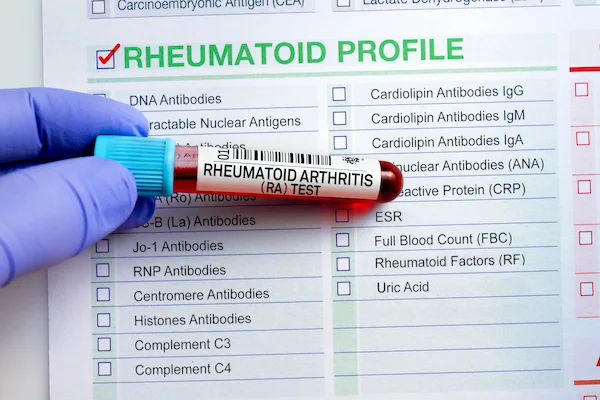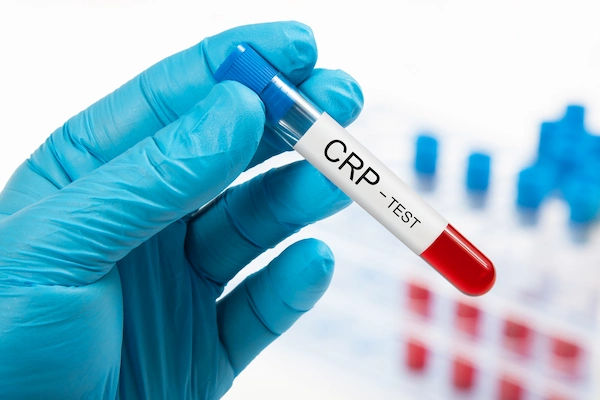What Positive C-Reactive Protein Means
Know about CRP, why, how and when it should be done. Learn how it can be used for the reduction of infection.

.webp?tr=q-80,f-webp,w-350,dpr-2,c-at_max 700w)
Introduction
When you get a blood test report showing a positive C-reactive protein (CRP), it can be confusing and worrying. So, this article will help you understand what it means, why it happens, and what steps you can take next.
What Is C-Reactive Protein?
C-reactive protein (CRP) is a substance produced by your liver in response to inflammation in the body, where inflammation acts as your body’s natural defence mechanism against infections, injuries, or chronic diseases.
A positive CRP test means that your CRP levels are higher than normal, indicating that there is some inflammation happening in your body.
Why Is a CRP Test Done?
Doctors recommend a CRP test to:
- Check for bacterial or
- Monitor autoimmune diseases like rheumatoid arthritis or lupus.
- Assess the risk of heart disease (high-sensitivity CRP test).
- Track recovery after surgery or injury.
What Does a Positive CRP Test Indicate?
A positive CRP result means your body is fighting some kind of inflammation. The higher the CRP level, the more severe the inflammation. Here’s what different CRP levels may indicate:
- Mild elevation (3-10 mg/L): This could be due to minor infections, mild injuries, or chronic low-grade inflammation like obesity or smoking.
- Moderate elevation (10-100 mg/L): Suggests a more significant infection like bronchitis, urinary tract infection or autoimmune flare-ups.
- Severe elevation (Above 100 mg/L): Often indicates serious bacterial infections (like pneumonia, sepsis) or major inflammation, such as in rheumatoid arthritis.
Common Causes of High CRP Levels
- Infections – Bacterial infections, for example, pneumonia, UTIs, cause a sharp rise in CRP. Viral infections may also increase CRP, but usually less severely.
- Chronic Diseases – Conditions like diabetes, heart disease, and obesity can cause long-term low-grade inflammation.
- Autoimmune Disorders – Diseases like rheumatoid arthritis, lupus, or inflammatory bowel disease trigger persistent inflammation.
- Injuries or Surgery – Trauma, burns, or post-surgical healing can raise CRP temporarily.
Cancer – Some cancers can increase CRP due to tumour-related inflammation.
Symptoms Associated with High CRP
Since CRP itself doesn’t cause symptoms, the signs you experience depend on the underlying condition:
- Fever and fatigue due to infections.
- Joint pain, stiffness (autoimmune diseases).
- Chest pain, shortness of breath (heart-related inflammation).
- Persistent digestive issues (IBD).
What Should You Do If Your CRP Is High?
One should consult a doctor, get treated and adopt lifestyle changes to lower the CRP:
Consult Your Doctor – A positive CRP test alone doesn’t diagnose a disease. Your doctor will review symptoms and medical history, and possibly order more tests like ESR, blood cultures, or imaging.
2. Treat the Underlying Cause – If an infection is found, antibiotics or antivirals may help. For autoimmune diseases, anti-inflammatory medications are often prescribed.
3. Lifestyle Changes to Reduce Inflammation
- Eat an anti-inflammatory diet (fruits, vegetables, whole grains, fish, nuts).
- Exercise regularly (moderate activity helps lower inflammation).
- Quit smoking and limit alcohol (both increase inflammation).
- Manage stress through yoga and meditation.
- Monitor Heart Health – If high-sensitivity CRP (hs-CRP) is elevated, your doctor may assess cardiovascular risk and suggest cholesterol management.
Consult Haematologist for high CRP values
When to Seek Immediate Medical Help?
If you have a very high CRP (above 100 mg/L) along with:
- High fever with chills
- Severe pain or swelling
- Difficulty breathing
- Confusion or extreme fatigue
This could indicate a serious infection or condition requiring urgent care.
Can CRP Levels Be Lowered Naturally?
Yes! While medical treatment is essential for infections or autoimmune diseases, these habits can help reduce chronic inflammation:
Turmeric & Ginger
Natural anti-inflammatory agents.
Omega-3 Fatty Acids
Found in fish, flaxseeds, and walnuts.
Adequate Sleep
Poor sleep increases inflammation.
Weight Management
Excess fat tissue produces inflammatory chemicals.
Final Thoughts
A positive CRP test is a signal from your body that something needs attention, whether it’s an infection, injury, or chronic condition. Instead of worrying, take it as a cue to work with your doctor and make healthy lifestyle adjustments.
If you’re unsure about your CRP results or need further evaluation, you can book a consultation or lab test through Apollo 24|7 for expert guidance.
Consult Haematologist for high CRP values
Consult Haematologist for high CRP values
Dr Sumanth R
General Physician
2 Years • MBBS
Bengaluru
PRESTIGE SHANTHINIKETAN - SOCIETY CLINIC, Bengaluru

Dr. Sushith C
General Physician
2 Years • MBBS
Bengaluru
PRESTIGE SHANTHINIKETAN - SOCIETY CLINIC, Bengaluru

Dr Abilash Jain
General Physician/ Internal Medicine Specialist
12 Years • MBBS,DNB(FM),MNAMS,FIAMS,CCGMG(GERIATRICS),DGM (GERIATRICS),PGCD(DIABETES,BOSTON UNIVERSITY),FID(DIABETICS UK)CCEPC(PALLIATIVE CARE),CCCC(CRITICAL CARE)
Visakhapatnam
Apollo Clinic Vizag, Visakhapatnam

Dr. Ramalinga Reddy
General Physician
5 Years • MBBS MD General medicine
Bengaluru
PRESTIGE SHANTHINIKETAN - SOCIETY CLINIC, Bengaluru

Dr. E Prabhakar Sastry
General Physician/ Internal Medicine Specialist
40 Years • MD(Internal Medicine)
Manikonda Jagir
Apollo Clinic, Manikonda, Manikonda Jagir
(150+ Patients)
Consult Haematologist for high CRP values
Dr Sumanth R
General Physician
2 Years • MBBS
Bengaluru
PRESTIGE SHANTHINIKETAN - SOCIETY CLINIC, Bengaluru

Dr. Sushith C
General Physician
2 Years • MBBS
Bengaluru
PRESTIGE SHANTHINIKETAN - SOCIETY CLINIC, Bengaluru

Dr Abilash Jain
General Physician/ Internal Medicine Specialist
12 Years • MBBS,DNB(FM),MNAMS,FIAMS,CCGMG(GERIATRICS),DGM (GERIATRICS),PGCD(DIABETES,BOSTON UNIVERSITY),FID(DIABETICS UK)CCEPC(PALLIATIVE CARE),CCCC(CRITICAL CARE)
Visakhapatnam
Apollo Clinic Vizag, Visakhapatnam

Dr. Ramalinga Reddy
General Physician
5 Years • MBBS MD General medicine
Bengaluru
PRESTIGE SHANTHINIKETAN - SOCIETY CLINIC, Bengaluru

Dr. E Prabhakar Sastry
General Physician/ Internal Medicine Specialist
40 Years • MD(Internal Medicine)
Manikonda Jagir
Apollo Clinic, Manikonda, Manikonda Jagir
(150+ Patients)

_0.webp)

.webp)
